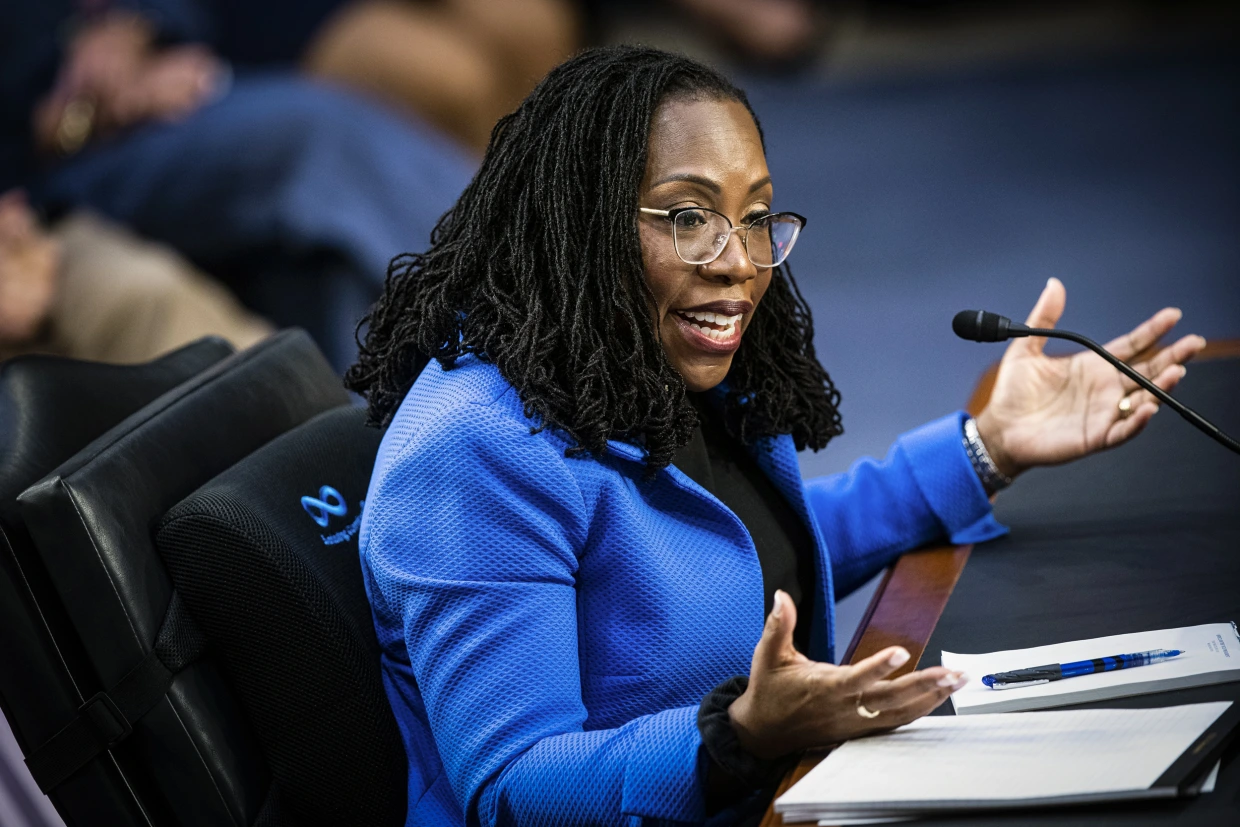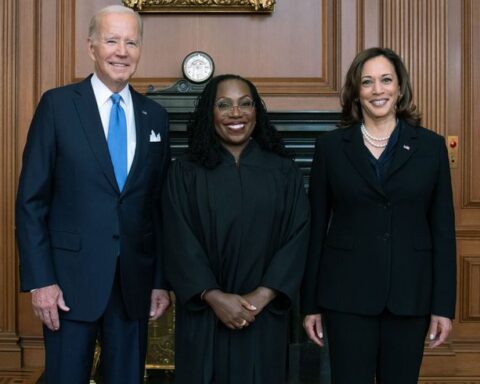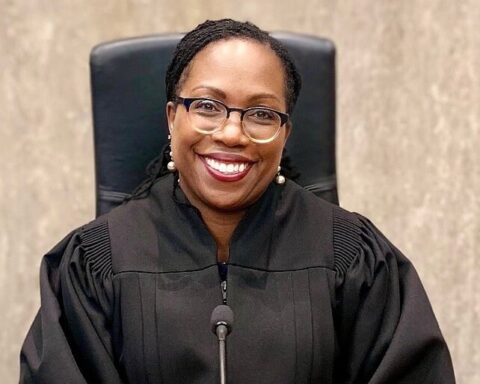Judge Ketanji Brown Jackson’s confirmation hearings may have been historic, in that she is the first Black woman nominated for the Supreme Court.
But they have not been without precedent, at least with regard to questions on crime and race that she faced from some Republican senators, such as Tom Cotton of Arkansas, who have tried to portray her as “soft on crime.”
Civil rights lawyer Sherrilyn Ifill, who is president and director-counsel emeritus of the NAACP Legal Defense and Educational Fund, tweeted Tuesday that listening to Cotton question Jackson reminded her of Arkansas Sen. John McClellan, who tried to derail Thurgood Marshall’s nomination to the Supreme Court by seizing on riots in the country and playing on Americans’ fears about crime during his 1967 confirmation hearing. Marshall was the nation’s first Black Supreme Court justice.
An Arkansas senator “attempting to associate a Black SCOTUS nominee with a rise in dangerous crime is also a page from the confirmation hearing for Thurgood Marshall,” Ifill tweeted Tuesday.
Guy-Uriel Charles, a professor at Harvard Law School, attributed that to what he described as a combination of “extreme partisanship” and racial and gender dynamics.
“There’s no doubt that the Republicans are trying to score as many partisan points as they possibly can with their base, and that they believe that there is some retribution to be paid for past Republican nominees,” such as Amy Coney Barrett and Brett Kavanaugh, he said. “So part of their motivation is clearly partisan. One has to account for that.”
He said there is no doubt that Republican senators such as Ted Cruz “have not been sufficiently attentive to the gender and racial dynamics” of accusing the first Black woman nominated for the Supreme Court of being soft on crime and distorting both her record as a judge and her writing when she was a law student. Cruz, who represents Texas, spent his time Tuesday afternoon questioning Jackson about her views on critical race theory and whether babies are racist. He also suggested that she coddles criminals. “Certainly, the racial aspect of it with Thurgood Marshall, there’s continuity there,” Charles said. The treatment of Jackson is even more complicated, he said, when you add in gender, partisanship and race.
Lisa Cylar Barrett, director of policy at the nonpartisan NAACP Legal Defense and Educational Fund, said nominees like Jackson who have worked as public defenders or, more broadly, in civil rights, are often painted as “sort of overzealous advocates or being soft on crime.”
In fact, Barrett said, “they quite often have dedicated substantial portions of their career to upholding the ideals and the laws of this country.”
She said Jackson’s diverse background — which includes nearly a decade as a federal judge, first on the U.S. District Court for the District of Columbia and then on the U.S. Court of Appeals for the D.C. Circuit — was being used to demonize her because “her credentials and qualifications for this position are so undeniable and unquestionable.”
Jackson, who has garnered support from lawmakers on both sides of the aisle in her three previous confirmation processes, has also earned the support of the Fraternal Order of Police.
These are among the reasons Charles said the suggestion that she is someone who coddles criminals couldn’t be further from the truth.
“Part of what’s actually, quite frankly, interesting to me is, she is very much in the mold of the God, country, service candidate,” Charles said. All three are qualities Republican senators purport to be looking for in a Supreme Court justice, he said.
“She’s not even close to the person that is being caricatured,” Charles said.
Tiffany Wright, an adjunct professor at Howard University and director of its Human and Civil Rights Clinic, said Jackson’s experiences as a Black woman have prepared her for this moment.
“This is her fourth Senate confirmation hearing, and then just being who she is in this profession, she is very used to sort of spurious attacks on her ideology, her views, her judicial approach, her qualifications,” Wright said. “So I think this is, like, light work for her. I’ve been very proud of the way that she is really staying above board.”
Still, Wright said, Cruz’s questions were “an insult to the entire process,” as were those of Sen. Marsha Blackburn, R-Tenn., who took quotes out of context and asked Jackson to define what a woman is.
Jackson responded, “I’m not a biologist.”
Jackson has also been subjected to racist tropes during the hearings, Charles and Wright said, including from Sen. John Neely Kennedy, R-La., who told her multiple times that she is “intelligent and articulate.”
“You could tell that there’s sort of an attempt to inoculate themselves,” Charles said. “They start out by saying, ‘You’re very qualified. You’re very articulate. You’re very intelligent.'”
He said it’s a poorly veiled attempt to suggest they are focusing on her record and are not engaged in race-baiting or treating her differently.
It’s a weight that Black people are accustomed to carrying, Wright said.
“We shouldn’t have to,” she said. “She shouldn’t have to. But she’s done it. That’s how she ended up here. And it just speaks to how far we have not come and, at the same time, how far we have come, the fact that there is a Black woman sitting there for the first time in history.”
Barrett said she hopes that, in the midst of the attacks, people do not lose focus of what really matters, which she said is the diversity of Jackson’s professional and personal experiences and what it would mean for the court, should she be confirmed.
“Her confirmation is not going to change the ideological balance of the court,” Barrett said. “But it is a really important step forward in moving us closer to the court being reflective of the multiracial and multiethnic society that we live in.”







